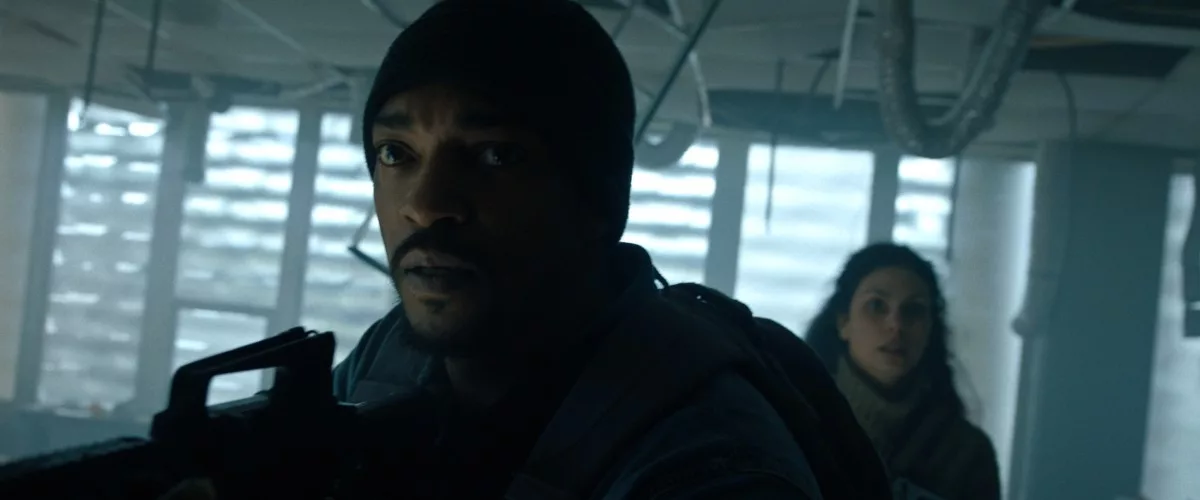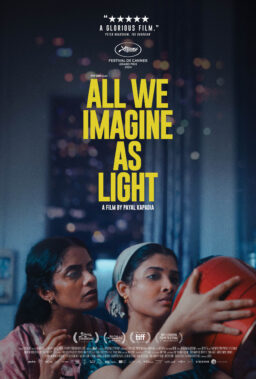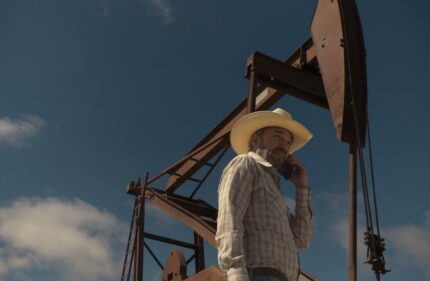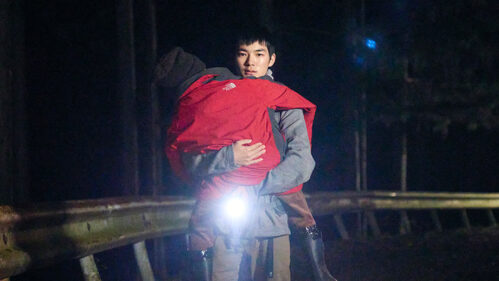There's a dexterity to director George Nolfi's post-apocalyptic creature feature "Elevation" that's admirably absorbing, even if you can't help but think of the (sometimes better) films it's riffing on. That's not a backhanded compliment, as many high-concept sci-fi films get unnecessarily convoluted in their attempts to be more than their genre ingredients. Nolfi smartly knows not to get in his own way; he takes a straightforward approach to a story of survivors who fight against bulletproof monsters that won't dare hunt them above eight thousand feet in altitude. It's less a commitment to unsophistication but an ingrained understanding of what makes flicks like this work: expedited world-building, dynamic action scenes, and just enough real-world thematic relevance to ground otherwise thinly written characters.
Set in the gorgeous Rocky Mountains in Colorado (the film often feels like a highlight reel to entice tourists), the film focuses on Will (Anthony Mackie), who lives there with his son, Hunter (Danny Boyd Jr.). Three years prior, creatures known as "reapers" came up from the ground and swiftly killed 95% of the population. For unknown reasons, the reapers won't bother humans at eight thousand feet, which bodes well for the hilly, mountainous communities (RIP to the Midwest) in the States. While Will and Hunter have been able to live comfortably despite the world-ending circumstances, their peace is continually at risk due to Hunter's health complications, which affect his breathing. Will resolves to go below the line of safety to get the proper resources to help him and is accompanied by Nina (Morena Baccarin), a physicist who is working on a way to kill the reapers, and Katie (Maddie Hasson), a family friend of Will's.
From there, "Elevation" shifts gears to feel equivalent to a video game sidequest, the trio going to new locations to grab items needed for their journey only to encounter (and barely survive) the reapers. Its setup contains few surprises: Will claims the path to get Hunter's medical supplies will be light on danger and high on reward, but we know such odysseys are rarely simple. We know that not all of the characters will make it to the credits and that there will be some third-act revelation about them that recontextualizes their savagery. As for the reaper design, they're the mimics from "Edge of Tomorrow," the white spikes in "The Tomorrow War," the deviants from "Eternals," etc., just in a different font.
The novelty comes through, however, in cinematographer Shelly Johnson's work. Johnson's warm framing of the Colorado alpines and foliage is disarmingly comforting: we know that for all of the natural beauty, there are reapers ready to tear the unsuspecting apart; the apocalypse has never looked this beautiful. When Will, Nina, and Katie fight (or, more accurately, flee from) the reapers, their flight is captured through long, sweeping drone shots, emphasizing how small humans are compared to the reapers and the landscape around them. This adds an extra layer of tension as we see that the trio are running in essentially open space, with little room to hide ("Ambulance," with all of its dizzying drone shots that feel like a phantom is operating the camera on shrooms, feels like the closest visual companion here, even if "Elevation" never quite reaches its levels of berserk).
Mackie and Baccarin turn in serviceable work here; their characters have allowed the trauma of losing family to shape them, which means their dejected delivery of the film's seemingly endless exposition is strangely appropriate where it might otherwise be grating. It's Hasson, a standout in this year's "Bone Lake," who is given the most opportunity to be multi-dimensional, bringing a rebellious zeal rooted in a belief that humanity can be back on top of the food chain that textures her hidden grief. In lieu of dialogue that organically adds depth to our understanding of these people, she's unfortunately saddled with monologues that try to fast-track our sense of empathy. (Right before a perilous sequence, we learn of her backstory before the reaper's arrival, which feels like an attempt to garner sympathy for someone who may or may not make it to the end).
I found myself stirred by the age-old adage that surviving isn't the same as living. In the film's opening, Hunter ventures beyond the safety line to take in nature and returns just in time before a reaper attacks him. While it's easy to berate his behavior (and Will certainly doesn't hold back), Hunter remains softly stubborn. "I just wanted to see other people," he says. He and Katie represent a younger generation who has seen the people before them only exist in survival mode, fighting so hard to stay alive for the next year or four that they've long ceased dreaming that a better way is possible. They know that living in damage control mode is its own kind of death. While Will and Nina may fight the physical battle against the reapers, Hunter and Katie see themselves as those who fight to taste and see beauty even despite the world's horrors; their battle is one of the soul, not to let bitterness and despondency destroy their minds and bodies. So, while "Elevation" may never rise above its genre trappings or escape the shadow of its influences, it never stoops so low as to be mindlessly vapid. Simply executed at ninety minutes, it's escapism of the highest order, offering perils at a screen's distance of safety.


















